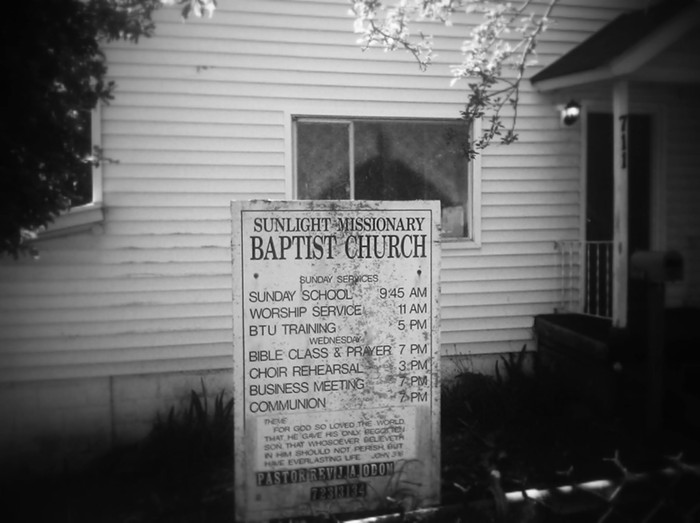
In recent years, King County has adopted an "end demand" approach to prosecuting prostitution. The strategy embraced by King County Prosecuting Attorney Dan Satterberg chooses to penalize sex buyers over sex workers—a strategy that Satterberg claims will help sex trafficking victims. Current sex workers, on the other hand, have argued the opposite: Criminalizing sex buyers is still criminalizing the sex trade, a practice that pushes sex work into even more dangerous and vulnerable corners.
On Monday, the Seattle Times Editorial Board wrote a piece in support of policies that aim to "end demand" for sex work. The Ed Board apparently didn't consider sex workers' arguments at all. Not long after the editorial was published, Seattle Times Editorial Board member Thanh Tan found herself facing criticism from sex worker advocates on Twitter.
Tan's Twitter response quickly revealed some of the major problems with the Seattle Times' argument.
But before we get to the problems with Tan's argument and the Seattle Times Editorial Board's piece, it's important to recognize this first: The fact that Tan was willing to engage with her Twitter critics is totally admirable. A lot of other people would have ignored those criticisms entirely.
At the same time, it's clear that the Ed Board—including Tan—has not interrogated the sex work "research" cited by King County Prosecutor Dan Satterberg very deeply. Today, Tan defended the editorial, which included statements like the following:
The average age of entry into prostitution is between 12 and 15 years old, according to the prosecutor’s office. While a few insist they work in the commercial sex industry by choice, a deeper look at many of their backgrounds often reveals they are victims of abuse, neglect and other trauma.
The "age of entry" myth—a common one—has been challenged by sex work advocates and research from anti-trafficking group Polaris. (When Politifact looked into the matter, they concluded that age of entry statistics were "murky" and any research supporting the myth was "old and limited.") Confronted with this, Tan wrote that the editorial "is based on local studies done here in the Seattle area, cited by prosecutor." She then tweeted that she and sex worker advocates "will have to agree to disagree on data/age of entry research, etc."
We have a difference of opinion and will have to agree to disagree on data/age of entry research, etc. @mistressmatisse @seattletimes
— Thanh Tan (@TanInSeattle) March 3, 2016
Last February, I reported a piece that took a hard look at the "local" research being cited by Satterberg's office. What I found was a collection of studies that drew flawed, biased conclusions about sex work and trafficking based on small sample sizes of populations that already skewed heavily toward victims of abuse or street workers.
For example, when I asked legislators to send me research about the claim that sex workers often come from a background of abuse, I was forwarded a letter from local anthropologist-activist Debra Boyer that incorrectly cited a fact from a famed book on trauma research. The claim, it turned out, actually came from an introduction to a book authored by anti-prostitution activist Melissa Farley. While the author of the trauma research—Judith Lewis Herman—had used clinical vignettes from sex workers already in trauma treatment to illustrate the idea that survivors of child abuse are vulnerable to revictimization, Herman did not claim that a majority or plurality of sex workers came from backgrounds of abuse. She was simply pointing out that survivors of child sexual abuse are vulnerable to being victimized again—not that sex workers are synonymous with survivors of child sexual abuse.
A more recent review of the scientific literature on the so-called link between histories of abuse and sex work found that many of the studies claiming a link were based on flawed methodology or biased samples. Jeffrey Parsons, founder of the Center for HIV Educational Studies & Training at Hunter College in New York, also told me that other factors like poverty can create a bigger risk of going into sex work than a history of sexual abuse.
But aside from the empirical problems with the Seattle Times' argument, there's also one big ethical issue at its center: Even if sex workers did have histories of sexual abuse or assault—histories that many women share, regardless of their occupations—does that mean they're incapable of making decisions in their own best interest?
The field of the sex work/sex-trafficking debate often lacks solid research, but even more often, it lacks nuance. "There's been no rigorous evidence to prove prevalence, how many [sex trafficking] victims actually exist," Meredith Dank, a Department of Justice-funded trafficking researcher, told me last year. Without that rigorous evidence, the Seattle Times has little reason to support policies that ignore the existence of consensual sex work altogether.














